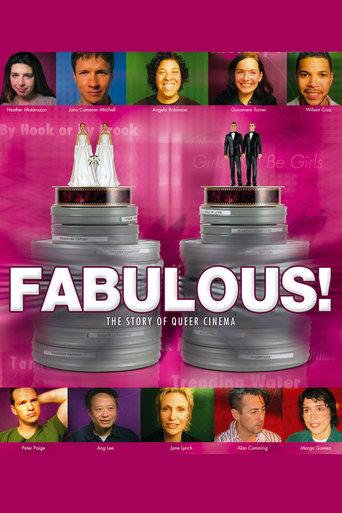

This is a very disappointing documentary purporting to cover the history of gay representation in cinema but lacking focus. The film zips quickly from Anger's Fireworks to films produced in the late 1960s, without a mention of the upfront art cinema and sub-textual mainstream films produced in-between. Instead we get supposed "experts" in the subject who don't appear to know what they are talking about - B Ruby Rich seems under the misapprehension that Jarman and Fassbinder were making films pre-Stonewall.After this barely credible preamble, the film settles down to talking about the series of New Queer Cinema films which were produced in the early 1990s. Many of these are important films, but the slant here is very US-centric and the discussion is rarely rises above the anecdotal. The story then zips forwards to a very uncritical look at how gay cinema has begun producing happy, shiny DVD fodder for middle-class audiences; it isn't surprising that Bruce LaBruce doesn't get a name-check! Nearly all of the talking heads here (with the exception of the great John Waters) cry out for a queer version of mainstream cinema; it would have been nice to have some dissenting voices. It would also have been nice to have a debate around a film like Basic Instinct - gay critic Camille Paglia loved the film but is airbrushed from the version of events presented here.The bias of the film gives the lie to the cry at the end for a pluralistic gay cinema; on this evidence, most of the people here hail from a very narrow, middle-class American background and most of them want a very anodyne, US-oriented gay cinema. This makes the film feel cliquey and a massive missed opportunity.
... View MoreSure, for a newcomer, 'Fabulous! The Story of Queer Cinema' was educational. For people that have been around the queer-independent block a few times, it was ho-hum for the most part. Some interviews were insightful, mostly by John Waters, but others told us what's already been said before. And the time line they showed throughout was a bit off-subject, if this was, in fact, a documentary on "queer cinema" and not on miscellaneous gay events. However, they did hit the nail on the head with the overabundance of "coming out" and "AIDS" stories. I seriously thought I would pull my hair out if another one of either genre came out in the 1990s. I understand this movie came out in 2006, so thankfully they got to 'Brokeback Mountain' but missed the new trend in more recent cinema: the return of homophobic male-bonding/bromance features. I even liked 2009's 'The Hangover' but once again, it seems the new trend is the recent craze to justify homophobic behavior. People do see it as funny, but unfortunately it allows the young males seeing this justify their hatred or simply scared actions. Unfortunately, this documentary didn't touch on that, but still it was an insightful look at pre-coming out cinema (including 'Beefcake' features) and it was nice to see a documentary that's raw and uncensored (full frontal nudity and language abound.) It's worth a viewing.
... View MoreI can't say that I agree with the earlier poster who claims the film doesn't represent gay men's films. Hello, John Waters, Don Roos and any number of other participants. There are far more glaring omissions than a few enjoyable mainstream 1990s indies and "The Boys in the Band." How about the entire history of avant-garde gay cinema, pre-1960s?Regardless, any survey this broad is obviously going to be shallow. You'd need a miniseries to cover the entire history of queer cinema across all eras, countries of origin and genres.This being an IFC documentary, it focuses on independent cinema. That makes sense.For a broader historical perspective, albeit a very Hollywood-focused, U.S.-centric one, check out The Celluloid Closet.
... View MoreDocumentary purporting to show clips from landmark gay films and how they developed over the years. I'm giving it a 9 but I can't say I liked it. The movie focuses mostly on lesbian, independent and transgender films. There's nothing wrong with that--but totally ignoring gay male films is not right. Where's "Boys in the Band" or "Jeffrey" or "Love! Valour! Compassion"? Those were landmarks and the gay male films they do cover ("Making Love", "Brokeback Mountain") aren't shown in any depth at all. It should be titled "Fabulous! The Story of Independent Queer Cinema". That aside this is fascinating. It shows gay directors and actors talking about the films, how they were made and released. Some truly fascinating remarks are here. Well worth seeing but totally ignoring gay male films bothers me. I give it a 9.
... View More